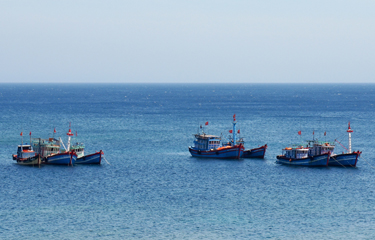Diplomatic relations in Southeast Asia have been strained in recent weeks following alleged encroachments by Vietnamese fishermen in Malaysian and Indonesian territorial waters.
Tensions have flared as inspectors from the European Commission are expected to visit Vietnam later this month or early June to review the “yellow card” given to Vietnam in 2017, imposed in part due to Vietnam’s failure to curb its fleet’s participation in illegal, unreported, and unregulated (IUU) fishing.
On 8 May, Malaysia’s Ministry of Foreign Affairs summoned Vietnam’s ambassador to demand an explanation of the large number of encroachments of Vietnamese vessels into Malaysian territorial waters. Ministry Deputy Secretary-General Raja Datuk Nushirwan Zainal Abidin received ambassador Le Quy Quynh and handed over a protest note expressing the Malaysian government’s objection to the encroachments, according to a statement from the ministry.
“The Vietnamese government was urged to take measures to rectify the situation,” the statement said.
A total of 748 vessels and 7,203 Vietnamese crew members have been detained by Malaysian authorities on suspicion of illegal fishing since 2006. The encroachments into Malaysian waters by Vietnamese fishermen are not only a threat to Malaysian citizens, but also a violation of Malaysia’s sovereignty and territorial integrity, and contravene international law, including relevant provisions of the United Nations Convention on the Law of the Sea (UNCLOS), the ministry’s statement said.
Despite the tiff, bilateral relations between Malaysia and Vietnam remain strong, with both countries enjoying “vibrant relations in a wide range of sectors under the Strategic Partnership framework,” the statement said.
“The repeated encroachments by Vietnamese fishermen would only hamper efforts made by both countries to strengthen relations,” Wisma Putra said in the statement.
Ambassador Quynh has taken note of the protest and given his assurance that the position of the Malaysian government would be conveyed to Vietnamese authorities, the statement said.
“Assurances were also given that these encroachments were illegal under Vietnamese law, and that the local authorities there would be informed of the matter,” it said.
Malaysia’s diplomatic engagement with Vietnam came just four days after Indonesia sank 51 foreign fishing vessels, including 38 Vietnamese-flag ones, that had been detained after being found to be engaged in illegal fishing.
Indonesia’s action, on 4 May, came a week after a clash at sea between two Vietnamese coast guard ships and an Indonesian navy patrol ship in South China Sea. Indonesia said its ship was rammed on 27 April by the two Vietnamese ships after intercepting a boat it said was fishing illegally in Indonesian waters. Indonesia detained 12 Vietnamese fishermen from the boat, which sank in the clash. Two others were rescued by Vietnamese ships.
But Vietnam’s Ministry of Foreign Affairs said on 2 May it handed over a second diplomatic note to the Indonesian Embassy in Vietnam to oppose Indonesia’s use of force on Vietnamese fishing vessels. The ministry said Indonesian forces had wrongly arrested the Vietnamese fishermen while they were operating within Vietnam's waters. It also demanded that Indonesia immediately release the crew of the sunk vessel, treat them humanely, and make adequate compensation for the Vietnamese fishing boat and for the fishermen.
Vietnam has had difficulty stopping illegal fishing by its fleet, despite a ramp-up of efforts to curb the practice by its government. Reports from Vietnam’s Directorate of Fisheries showed that, last year, 137 vessels with 1,162 fishermen were found illegally fishing in foreign waters, including in Thailand, Malaysia, the Philippines, Cambodia, Indonesia, and Brunei, up from 91 vessels in 2017. So far in 2019, those numbers have reached 46 vessels and 96 fishermen.
On 29 April, Vietnam’s Prime Minister Nguyen Xuan Phuc requested the country’s Ministry of Agriculture and Rural Development report on the progress of the implementation of the European Commission’s recommendations over illegal fishing. He asked local authorities to severely punish fishermen who operate illegally in other countries’ waters.
On 23 April, the Agriculture Ministry held an urgent conference with relevant government bodies to discuss issues concerning the E.C. yellow card. The meeting, chaired by Minister Nguyen Xuan Cuong, was convened after the ministry acknowledged its inability to fully control illegal, unreported, and unregulated (IUU) fishing activities by local fishermen in other countries’ waters.







